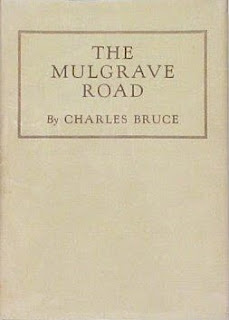
Bad Men of Canada
Thomas P. Kelley
Scott Young, Neil's dad, had a pretty good story about Thomas P. Kelley. It begins with the two men taking a morning stroll on Toronto's Wellington Street. A panicked pulp editor interrupts, offering Kelley good money to deliver a story before noon. Kelley accompanies the man back to the magazine's offices, is given a title – "I Was a Love Slave" – and begins typing. He joins Young for lunch $200 richer.
No blockhead, Kelley wrote for money and he wrote rapidly; there were no second drafts. With fiction, he would sprint with an eye on the word count, coming up with an ending only when approaching the finish line.
Non-fiction didn't offer quite the same freedom. It wasn't that Kelley felt bound by facts, more that he tried to keep them in mind. Bad Men of Canada is a typical of his approach. Short on names and dates, filled with imagined dialogue, the stories are excited and repetitive. Reading Kelley's words is not unlike listening to an old-timer – yes, old-timer – down at the local pub. Here, for example, is the writer's description of American serial killer H.H. Holmes:
Physically, he was a weakling. He had buck teeth, his nose was somewhat flattened, and he had a habit of drooling from the corners of his mouth.
In brief, in appearance, H.H. Holmes was an awful mess! And yet, the gals went for him in a big way! Don't ask me why – your guess is as good as mine!
The inclusion of Holmes, subject of the first of the book's ten chapters, is a cheat. True, the man once visited Toronto – he even stayed long enough to murder two children – but Holmes has about as much to do with this country as Charles Ng. Not all the chapters concern Bad Men of Canada, and the pitch line – "A History of the Ten Most Desperate Men in Canadian Crime" – is just as loose. Just who is the desperate man in chapter four, "Four Bad Men"? And what about chapter two, "The Terrible Donnelly Feud"? Is it one of the Donnellys or a member of the mob that killed them?

It was no surprise to see the Donnellys in this book; Kelley mined their sordid story throughout his career. In fact, he'd included the Donnellys in Famous Canadian Crimes, a collection of his New Liberty Magazine pieces, just one year earlier. There's a good deal more overlap between Famous Canadian Crimes and Bad Men of Canada – overlap that goes far beyond subject. Whole paragraphs are carried over unchanged from one book to the other, while others undergo minor rewrites. "It was a spring morning in 1879 when four desperadoes galloped into the small village of Ashcroft, B.C., with gun blazing," in Famous Canadian Crimes, becomes: "On a bright summer morning in 1879, four desperadoes galloped into the small village of Ashcroft, B.C., with guns blazing."
Spring, summer... who remembers? Anyway, it was a morning.

All this recycling seems a bit disingenuous given Kelley's introduction:
To be sure there are other cases that could have been included in this volume. But a volume allows just so many pages – and just so many cases. If the reader, after perusing this volume would like to read the stories of more Bad Men of Canada, a letter to the publisher might encourage a sequel.
That Kelley, already looking to pull another job.
Favourite sentence: "'Here he comes,' he whispered. 'It's Ryan!'"
Object: A fragile massmarket paperback, typical of its time.
Access: Another Arrow obscurity. No copies are currently listed for sale online. It seems that the only library copy in the world is held at the University of Michigan's William L. Clements Library. "The Clements Library contains a wealth of primary sources for the study of early American history," says the university's website.



















